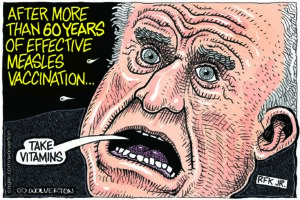How Trump Is Making America Less Safe for Victims of Domestic Violence
Slashed and paused funding, mass firings, and information purges have destabilized an infrastructure that took 40 years to build. President Donald Trump, right, and Speaker of the House Mike Johnson, R-La., left at the Capitol in Washington on May 20, 2025. (AP Photo/Rod Lamkey, Jr.)
President Donald Trump, right, and Speaker of the House Mike Johnson, R-La., left at the Capitol in Washington on May 20, 2025. (AP Photo/Rod Lamkey, Jr.)
This story was originally published by The 19th.
Over the last four decades, the United States has built a web of federal policies and funding to address domestic and intimate partner violence, a pervasive health and safety crisis.
In just 130 days, the Trump administration has put that safety net in jeopardy.
Funding pauses, cuts, firings and information purges have destabilized the infrastructure that helps victims of abuse. At the same time, federal teams dedicated to preventing sexual violence are being decimated. Departments in charge of administering grants that fund shelters for those fleeing assault have been deemed “duplicative, DEI or simply unnecessary.”
The first budget recommendation proposed by the administration of a man found liable for sexual abuse suggests eliminating the team tackling rape prevention and education. It takes a limited view of who is worthy of help to flee abuse. These changes limit how federal funds can be used to support survivors and emphasize criminal consequences for perpetrators over a more holistic view of justice.
Federal teams dedicated to preventing sexual violence are being decimated.
The federal government has long recognized domestic violence and violence between romantic partners as a critical public health and safety issue. Four out of every 10 women say they’ve experienced violence at the hands of an intimate partner, according to a survey from the Centers for Disease Control and Prevention (CDC). Among men, a quarter reported being victims. Intimate partner violence can be deadly, particularly for women: More than half of all women that are homicide victims are killed by a current or former partner, according to a CDC study.
In 1994, Congress recognized violence against women as a national crisis and passed a law that supercharged the government’s funding and attention to the issue. It hasn’t solved the problem — but lawmakers and advocates say the Violence Against Women Act and its predecessor, the Family Violence Prevention and Services Act, have been essential to the protection of victims and the decline in violent crime.
Tightening the purse strings
Federal grant programs are the lifeblood of domestic violence services programs — and they have been threatened since the day President Donald Trump returned to office.
His executive orders on gender and “illegal” diversity, equity, inclusion and accessibility led to lists of banned words. Federal departments raced to sanitize their communications, eradicating decades of research and data.
Meanwhile, the Office of Management and Budget issued a short-lived freeze on funding distributions pending evaluation of programs for compliance with executive orders. Nonprofits that relied on federal funds to provide services to victims of domestic violence scrambled for legal advice: Was their budget at risk because they had a pride flag on their website? Did they also have to erase all mentions of banned words?
The National Domestic Violence Hotline, which is largely funded by appropriations from the Department of Health and Human Services, removed resources for LGBTQ+ survivors from its website. The majority of state domestic violence coalitions, the umbrella organizations that support direct service providers, took their websites offline — though when asked if it was related to Trump’s actions, most declined to answer on the record.
Is an organization’s budget at risk because it has a pride flag on its website?
So far, there has been only one reported case of a grant from the Office on Violence Against Women being revoked, but hundreds of grants already issued by the Office of Justice Programs were abruptly canceled because they no longer aligned with the administration’s priorities. Even while some of the cuts were reversed, the moves created uncertainty that makes it impossible for victims services organizations to plan, increasing the stresses of work that is already difficult and traumatic.
Then it was not just current funding, but future provisions that came under fire. The Office on Violence Against Women removed all open notices of funding opportunities from its website on Feb. 6. New versions weren’t released for three months, disrupting the grant cycle that concludes Sept. 30, the end of the government’s financial year. Revised notices included major changes to department priorities and a longer list of activities ineligible for funding.
The U.S. attorney general has the authority to prioritize areas for grantmaking. Notices posted before Trump took office didn’t have any; now applications are given bonus points in the review round if they “combat human trafficking and transnational crime, particularly crimes linked to illegal immigration and cartel operations” or seek to improve services in small towns, rural areas or tribal nations.
The section defining what is ineligible for funding has ballooned. In addition to complying with executive orders on gender and DEI, the new restrictions put forth a more limited view of interventions around domestic violence. Activities that “frame domestic violence or sexual assault as systemic social justice issues rather than criminal offenses (e.g., prioritizing criminal justice reform or social justice theories over victim safety and offender accountability)” are banned, as well as activities that “discourage collaboration with law enforcement.” Initiatives that “prioritize illegal aliens over U.S. citizens” are also not allowed.
Rita Smith, an international expert on violence against women, is publicly raising the alarm about these changes. As the Office on Violence Against Women announces new grants on LinkedIn, Smith reshares them to her large network with a warning.
“I think if people apply for these grants and they get them, it may open them up to the kind of scrutiny that they’re not used to getting from the Department of Justice,” Smith said in an interview. She’s worried that organizations will be subject to intrusive data collection or information gathering, especially around the immigration status of their clients.
Smith used to work in direct services and now has a more administrative role in the movement against domestic violence.
“We never required anyone to show us their immigration papers,” she said. “We didn’t ask for documentation if people said they were in danger. If they processed through the intake questions that we had, and we determined that they were in danger, we gave them shelter.
“We didn’t ask them for a green card. We didn’t ask them for visas. We just brought them in to make them safe.”
“We didn’t ask for documentation if people said they were in danger.”
The administration’s priorities conflict with some recent moves to better reach diverse populations. The 2022 reauthorization of the Violence Against Women Act created a funding scheme for culturally specific service providers, which are tailored to the needs of Asian, Black Native American, Native Hawaiian and Pacific Islander or Latinx survivors. But how are those organizations supposed to operate when DEI is banned? How can nonprofits supporting LGBTQ+ survivors do their work without acknowledging the trans community? Guidance remains piecemeal and oftentimes unofficial — no one knows exactly how to bulletproof their organization.
Smith sees the new restriction on funding as a way to redefine who is a victim in the eyes of the federal government. The requirements are so onerous that it can make it hard for nonprofits to serve their purpose: helping people escape violence.
Some organizations have made the decision to refuse federal funds because it comes with conditions antithetical to their mission. But the gaps left will be hard to fill.
With CDC cuts, federal prevention efforts decimated
When the Trump administration fired nearly every federal employee within the CDC’s Division of Violence Prevention, it did away with the only team at the federal level working specifically on domestic and intimate partner violence prevention.
The program they oversaw — called DELTA, or Domestic Violence Prevention Enhancements and Leadership Through Alliances — was first created in 2002 to harness federally funded research and expertise on the causes of intimate partner violence, along with the connections of state and local domestic violence groups, so fewer people become victims in the first place.
Getting that work off the ground asked already strained groups trying to serve victims to shift some of their energy to prevention work, but staff at the CDC at the time, and until April, remained committed to what one laid-off worker referred to as the “cultural norms change” that’s a key part of preventing domestic and intimate partner violence.
Under DELTA, which currently funds 13 state-based domestic violence networks, the CDC helps state groups implement prevention programs and measures how successful they are at preventing violence.
“If you remember taking a class on healthy relationships, or seeing PSA about domestic violence, or anything like that in your school or communities — those are some examples of our prevention work,” said one former federal worker within the Division of Violence Prevention who was part of the administration’s “reduction in force.” They declined to be named out of fear of losing their remaining federal benefits.
“People, I think, sometimes take it for granted, because it’s just something that’s there. But those kinds of things are going to go away, and no one is going to be there to teach our kids about healthy relationships or help communities reshape the norms around what’s acceptable in how we treat one another.”
“All of that stuff will be gone.”
“All of that stuff will be gone.”
The administration has not clawed back funding for the current budget year from the 13 DELTA states, but staff in those states are doing without the expertise of staff at the CDC. The Trump administration has proposed slashing DELTA altogether next year, alongside the other programs under the Division of Violence Prevention, calling the spending “duplicative, DEI or simply unnecessary.”
The Pennsylvania Coalition Against Domestic Violence, which receives nearly half a million dollars in funding through DELTA, said the funding cut would be “catastrophic.” DELTA “is the only dedicated federal funding source for the primary prevention of domestic violence and a critical tool for driving real, lasting change,” said Jennifer Beittel, a spokesperson for the group.
Hema Sarang-Sieminski, the executive director of Jane Doe Inc., the Massachusetts sexual assault and domestic violence coalition, said their CDC grant managers were all laid off. She found their advice and expertise invaluable; the team created resources for working with LGBTQ+ survivors and culturally specific communities. Jane Doe Inc.’s grant was for five years, and Sarang-Sieminski just reapplied, as required for year two. It’s unclear what support her organization will have moving forward.
Of the 61 million women nationwide who say they’ve experienced violence at the hands of a romantic partner, 16 million reported first experiencing it before they turned 18. The administration’s staffing cuts and proposed budget cuts would also hit the CDC’s team focused on teen dating violence.
That team developed a program called “Dating Matters,” the first comprehensive teen dating violence prevention effort in the United States using funding appropriated by Congress. The funding came after several high-profile cases of dating violence, in particular the 2005 death of Rhode Island student Lindsay Ann Burke, whose boyfriend was convicted of her murder. Her parents became advocates for teen dating violence education efforts, arguing that their daughter may not have had enough information about the dynamics of abusive relationships before her death.
One longitudinal study on sixth through eighth graders across four cities that adopted the CDC’s Dating Matters model for middle school found that by the 11th grade, the program had reduced not only dating violence, but also sexual violence, harrassment, substance use and delinquency. In 2024, the team published a guide specifically for LGBTQ+ youth, who face higher rates of dating and sexual violence.
In January, after Trump took office, those resources were deleted to comply with the executive order on “radical gender ideology.” By April, the whole team had been laid off.
An update and rebrand of the Dating Matters program was slated to publish later this year, but it’s unclear who will carry it to the finish line.
The program had reduced not only dating violence, but also sexual violence.
“Dating Matters consumed a lot of my life, and it was destroyed for no reason whatsoever,” said Sarah DeGue, senior scientist in the Division of Violence Prevention, who led the CDC’s Dating Matters program for the last decade. “American teens are in the midst of a mental health crisis. … This is the absolute worst possible time to eliminate effective programs and resources that teach kids healthy relationship skills.”
DeGue was part of the administration’s so-called “reduction in force.” Since leaving the CDC, she has started her own consulting firm focused on violence prevention and is uploading deleted resources to her firm’s website.
The former CDC employee who declined to make their name public said they hope lawmakers can intervene to protect the work. “I believe that there are still people in Congress, in our government at that level, who care … but not the Trump administration. I don’t believe that at all.”
Strategies of resistance
In his first term, Trump floated cuts to the Office on Violence Against Women but didn’t follow through. Now, groups are acutely aware of how many people will suffer — and die — without the funding that makes their services possible.
Two prominent lawsuits are challenging the constitutionality of these cuts. The American Bar Association won a preliminary injunction in a case alleging its five grants from the Office on Violence Against Women were canceled as retaliation for suing the administration. The $2 million of outstanding grants were to employ seven people to provide training to legal practitioners working with survivors of domestic violence, sexual assault and stalking.
FORGE, the only domestic violence services nonprofit dedicated solely to assisting transgender and nonbinary survivors, relies on the federal government for 90 percent of its operating budget. In February, it joined other LGBTQ+ organizations in suing the Trump administration over the constitutionality of the executive order about gender. In April, the Office of Justice Programs canceled FORGE’s grants — over $500,000 in total — to produce a toolkit for providers working with trans victims of crime and a project addressing anti-trans hate .
Arguments in FORGE’s case were held on May 22 in a California district court. An order is expected soon.
“What keeps me up at night is thinking about the stories we will tell about this time, looking back.”
The federal funding freeze in January spooked Jane Doe Inc., Sarang-Sieminski said. Worried about conflicting with executive orders, the nonprofit took its website down. But after two days, it put the site back online.
Reflecting on their core mission of racial equity is what changed the staff’s minds, Sarang-Sieminski said. The site still has sections tailored to LGBTQ+ and immigrant survivors and speaks about building a more equitable world. “It’s so through-and-through who we are that we felt like there’s nothing that we really could possibly take down that would protect us in any meaningful way,” she said. Taking down the website would “only do further harm to communities who are counting on us to speak up and to be present and available when others refuse to.”
“What keeps me up at night is thinking about the stories we will tell about this time, looking back,” Sarang-Sieminski said. “This is liberatory work, and what we want to see is a world where we can all thrive. And to me that means not leaving folks behind and standing up for our fundamental principles around this work.” Half of the organization’s funding is dependent on federal grants, but she doesn’t want that to “cloud our judgment around our values.”
On Thursday, Democratic Reps. Gwen Moore of Wisconsin and Debbie Dingell of Michigan, and Republican Rep. Brian Fitzpatrick of Pennsylvania, will join a coalition of intimate partner and sexual violence groups for a day of action on Capitol Hill to discuss the importance of federal funding. Both Moore and Dingell have led several letters to the administration pushing back on funding delays and staffing cuts.
“I am horrified,” said Moore, who has detailed her experience as a victim of domestic violence. “Maybe it’s not intentional, but it’s very dangerous as a survivor of domestic violence — a survivor in the days where there was no crisis line to call … no information to be able to stand up for yourself. There was no shelter to go to.”
“We’ve made so much progress in the last decade,” Dingell said. “We’re going backwards, and it really scares me.”
Domestic violence services remain operational throughout the United States. Confidential, anonymous help is available 24/7 through the National Domestic Violence Hotline at (1-800-799-7233) or online.
Dig, Root, GrowThis year, we’re all on shaky ground, and the need for independent journalism has never been greater. A new administration is openly attacking free press — and the stakes couldn’t be higher.
Your support is more than a donation. It helps us dig deeper into hidden truths, root out corruption and misinformation, and grow an informed, resilient community.
Independent journalism like Truthdig doesn't just report the news — it helps cultivate a better future.
Your tax-deductible gift powers fearless reporting and uncompromising analysis. Together, we can protect democracy and expose the stories that must be told.
This spring, stand with our journalists.
Dig. Root. Grow. Cultivate a better future.
Donate today.








You need to be a supporter to comment.
There are currently no responses to this article.
Be the first to respond.